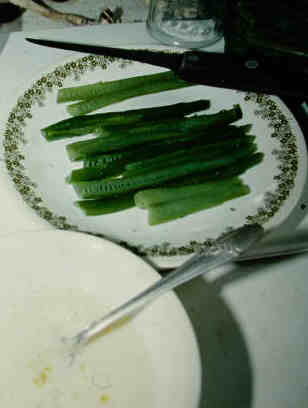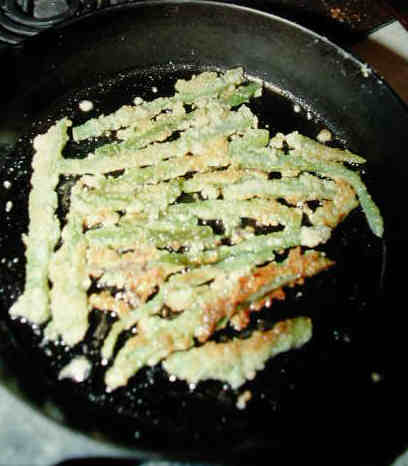| 04-22-02
"Morel mushrooms come and go," he said lightly (as though his
heart were not breaking at the lack of success--and fried morels--he had
encountered).
"Morels, or no morels," he continued, "pokeweeds are sending their tender,
little shoots up through the earth now and I will dine on them without
knowing the difference."
So the make-believe, phony man addresses the hypothetical situation--this
strange shortage of morels--and lands on one of his favorite foods, fried
pokeweed shoots.
It's the truth, it's actual, pokeweeds are, indeed, coming up now from
one end of Indiana to the other, and they are awfully tasty when fixed
just right--so tasty, indeed, that where I come from (good ol' Crothersville
and environs) poke shoots are known as "the poor man's morel."
To say that anything could possibly replace the morel in the minds of
natural foods gastronomes would be sheer folly, if not heresy. But even
in a year when I am finding all of the morels my diet can handle, I still
like "a mess" of fried poke shoots now and then.
One of the great features of collecting and processing poke shoots for
the table, will be found in the fact that you don't have to look for them
at this time of year. They look for you.
Sure, they are only three or four inches high when they are at their
tendermost best, but their presence will be telegraphed to the world by
last year's cream-colored stalks (maybe with black splotching). Find the
old stalks of a pokeweed patch from last year, and you will see the dark
green shoots of this year's growth coming up from the old tubers (roots).
With a sharp knife, cut the new shoots off at ground level. It doesn't
take many to fill a skillet. Cutting off the new shoots will not discourage
this plant. It still will grow as much as six to10 feet through the summer,
produce its shiny purple berries (a source of ink in yesteryear), and continue
a healthy existence.
Trim or peel off loose leaves under cold, running water, then parboil
the green shoots (somewhat like asparagus) until they can be pierced with
a fork. A piece of bacon will add its special touch in the parboiling.
When shoots are tender, drain off the water, feed the bacon to your
'coon dog, and allow the shoots to cool enough to handle them comfortably.
Slice each shoot in half (lengthwise), then fry them just as you would
have fixed the morels if your luck had been better.
Morels and poke shoots can be prepared in many ways, but I will take
my method of frying these delicacies over all others. It is simple.
Roll a good grade of crackers (I like Sunshine wheat crackers) as fine
as you can get them in a sandwich bag with some solid, round object like
a rolling pin or even a sturdy, round drinking glass. Mix the cracker meal
50-50 with flour on a dinner plate. In a shallow bowl (say a cereal bowl)
break an egg or two, and beat them into an equal amount of milk.
While the egg-milk mixture is being prepared, melt three or four tablespoons
of butter in a skillet and stir in a little olive oil. The bottom of the
skillet should be covered with a thin film of the butter-olive oil mixture.
When a cracker crumb sizzles in the skillet, (moderate heat), dip poke
shoots in the milk-egg mixture and roll each well in the cracker meal-flour
mixture. Place each shoot on the bottom of the skillet (only one layer),
and sprinkle with salt and pepper to taste. Pat them gently with a spatula
to make sure each is exposed to cooking agent and heat.
Turn shoots when brown on the first side. At this time you may want
to add more butter and olive oil to make sure second sides are exposed
to the cooking agent.
A-TIP-OR-TWO--Treat each piece
of poke shoot as you would treat morel halves to maintain their identity
. . . Serve fried poke shoots with any foods compatible with fried morels
. . . Gravy goes well with fried poke shoots, as does a thin coating of
soft cheese (your choice), or a dusting of grated cheese . . . The empty
skillet is a great place to make the gravy.

|
 |
Poke shoots on plate ready
to be dipped and fried
|
Poke shoots frying
in my old iron skillet
|
|

